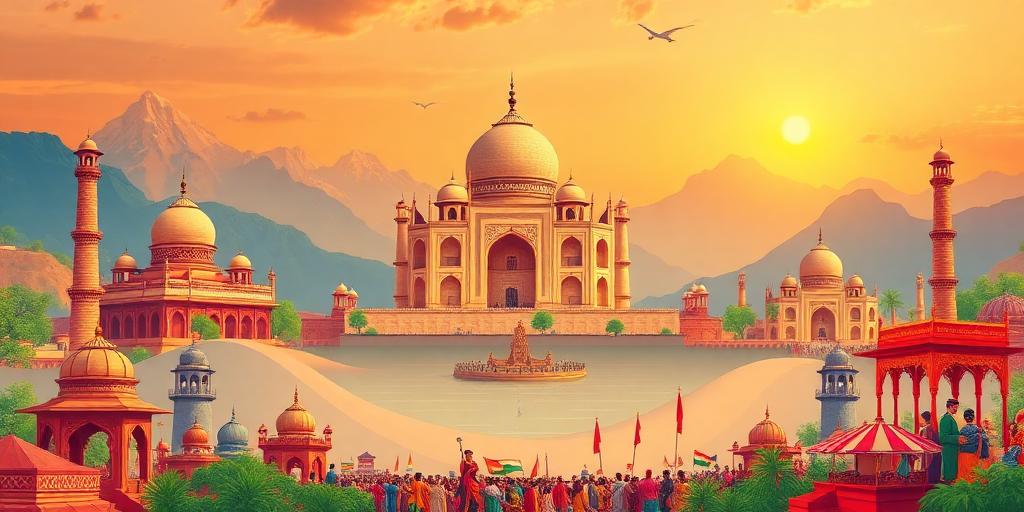Sarkari Yojana for Promoting Tourism in India 2025: A Detailed Overview
India's rich cultural heritage, diverse landscapes, and historical sites make it a prime destination for tourists worldwide. Recognizing the potential of the tourism sector to contribute significantly to the nation's economy and employment generation, the Government of India has consistently launched various initiatives to promote and develop tourism. The 'Sarkari Yojana for Promoting Tourism in India 2025' is the latest in this series, aiming to provide a comprehensive framework for sustainable and inclusive growth of the tourism industry.
Objectives of the Yojana
The primary objectives of the 'Sarkari Yojana for Promoting Tourism in India 2025' are as follows:
- Enhancing Infrastructure: Developing and upgrading tourism-related infrastructure, including roads, airports, railways, and accommodation facilities.
- Promoting Sustainable Tourism: Encouraging eco-friendly tourism practices that minimize environmental impact and preserve cultural heritage.
- Skill Development: Providing training and skill development programs for individuals employed in the tourism sector to improve service quality.
- Marketing and Promotion: Launching targeted marketing campaigns to attract both domestic and international tourists.
- Digitalization: Leveraging digital technologies to enhance the tourist experience, from online booking to virtual tours.
- Community Participation: Engaging local communities in tourism development to ensure equitable distribution of benefits.
Key Components of the Yojana
The Yojana comprises several key components designed to achieve its objectives:
1. Infrastructure Development
- Upgradation of Tourist Sites: Identifying and upgrading key tourist sites across the country, including historical monuments, national parks, and pilgrimage centers.
- Connectivity Enhancement: Improving road, rail, and air connectivity to remote and lesser-known tourist destinations.
- Development of Accommodation Facilities: Providing incentives for the construction of hotels, guesthouses, and homestays in tourist areas.
2. Sustainable Tourism
- Eco-Tourism Circuits: Developing eco-tourism circuits in biodiversity-rich regions to promote nature-based tourism.
- Waste Management: Implementing effective waste management practices at tourist sites to maintain cleanliness and hygiene.
- Energy Conservation: Promoting the use of renewable energy sources in tourism-related establishments.
3. Skill Development
- Training Programs: Conducting training programs for tourist guides, hotel staff, and other service providers to enhance their skills.
- Certification Courses: Offering certification courses in various aspects of tourism management to ensure quality standards.
- Entrepreneurship Development: Encouraging entrepreneurship in the tourism sector by providing financial assistance and mentorship.
4. Marketing and Promotion
- International Campaigns: Launching international marketing campaigns to promote India as a preferred tourist destination.
- Domestic Tourism Promotion: Organizing events and festivals to showcase the diverse attractions of different states.
- Digital Marketing: Utilizing social media, online advertising, and other digital channels to reach a wider audience.
5. Digitalization
- Online Booking Platforms: Developing online platforms for booking accommodation, transportation, and tours.
- Virtual Tours: Creating virtual tours of tourist sites to provide an immersive experience for potential visitors.
- Mobile Apps: Launching mobile apps with information on tourist destinations, local attractions, and emergency services.
6. Community Participation
- Local Employment: Prioritizing the employment of local residents in tourism-related activities.
- Community-Based Tourism: Promoting community-based tourism initiatives that empower local communities and preserve their cultural heritage.
- Revenue Sharing: Ensuring that a portion of the revenue generated from tourism is used for community development projects.
Implementation Strategy
The 'Sarkari Yojana for Promoting Tourism in India 2025' will be implemented through a coordinated effort between the central government, state governments, and local authorities. A dedicated project management unit will be established to oversee the implementation process and ensure timely completion of projects. Regular monitoring and evaluation will be conducted to assess the impact of the Yojana and make necessary adjustments.
Expected Outcomes
The successful implementation of the 'Sarkari Yojana for Promoting Tourism in India 2025' is expected to yield the following outcomes:
- Increased Tourist Arrivals: A significant increase in both domestic and international tourist arrivals.
- Employment Generation: Creation of new employment opportunities in the tourism sector.
- Economic Growth: Contribution to the overall economic growth of the country.
- Infrastructure Development: Improvement in tourism-related infrastructure.
- Sustainable Tourism Practices: Adoption of sustainable tourism practices that minimize environmental impact.
- Community Empowerment: Empowerment of local communities through tourism-related activities.
Conclusion
The 'Sarkari Yojana for Promoting Tourism in India 2025' represents a strategic and comprehensive approach to harnessing the potential of the tourism sector. By focusing on infrastructure development, sustainable tourism, skill development, marketing and promotion, digitalization, and community participation, the Yojana aims to transform India into a world-class tourist destination. The successful implementation of this initiative will not only boost the economy but also preserve the country's rich cultural and natural heritage for future generations.









